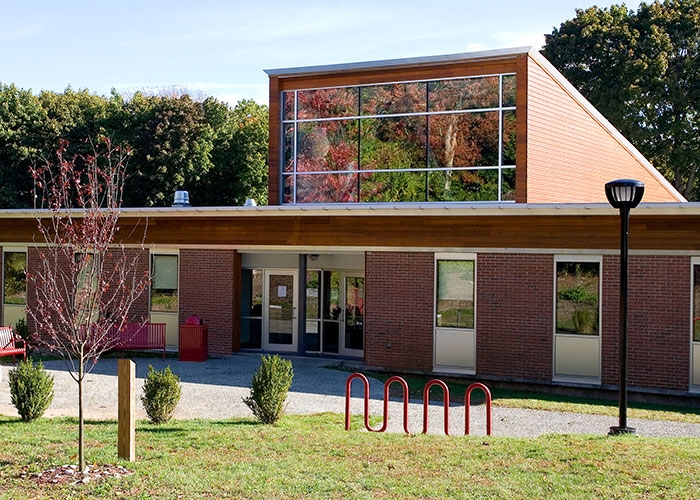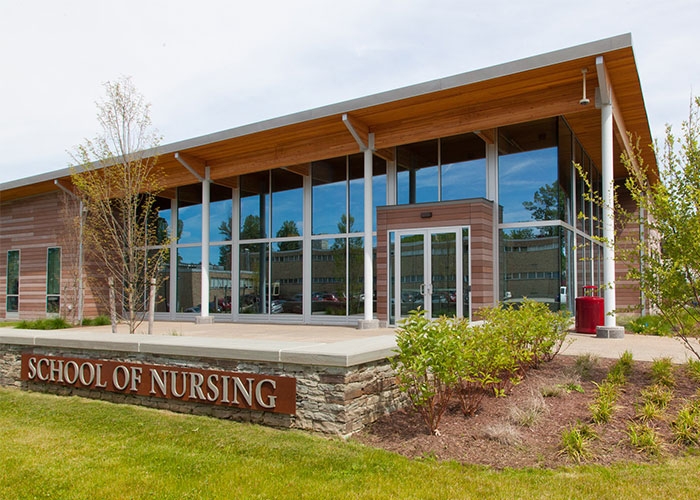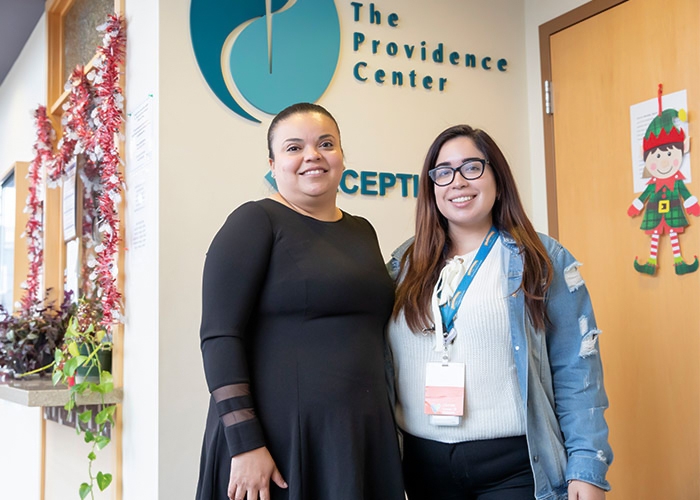RIC Answers the Call for Adult Education and Workforce Development, Part II
- News & Events
- News
- RIC Answers the Call for Adult Education and Workforce Development, Part II

Rhode Island College is employing innovative strategies to educate all Rhode Islanders.
This article is a continuation of “RIC Answers the Call for Adult Education and Workforce Development, Part I”
Creating Convenience for Adult Learners

New models of course delivery are taking root in the college’s School of Social Work and Zvart Onanian School of Nursing.
Graduate social work courses focused on clinical training are now being held on weekends. The courses, which began in Fall 2022 with an initial cohort of 29 participants, are designed to help students learn clinical treatment modalities and evaluate whether their practice work is efficient.
“During information sessions, we heard from students who wanted more flexibility, so we decided to start the weekend courses,” says Jennifer Meade, chair of the Master of Social Work program, who created the weekend program in collaboration with former School of Social Work Interim Dean Jayashree Nimmagadda. “We will continue with more classes, and I have a feeling they’re going to be pretty packed.”
Weekend courses are flexible, manageable, create a sense of community and recognize that people have busy lives and other responsibilities.
These are the type of courses that Warner says he’s pushing to become more relevant at RIC. Deborah Bergner, a student in one of the courses, says the weekend program is a winning concept.
“It’s flexible, manageable, creates a sense of community and recognizes that people have busy lives and other responsibilities,” she says. Bergner works as a residential life and housing coordinator at the University of Rhode Island (URI) doing field work in URI’s Counseling Center and she serves on the town council in South Kingstown.
“There’s a range of people in the classes, from new bachelor’s degree grads to older people like me,” she says. “I applaud the School of Social Work administrators for piloting this program. They want it to work, and we [students] want it to work, too.”
Meade says the program was curated to include contributions from both tenured and adjunct faculty.
“For this to be successful, we wanted the program to mirror what we do with the regular weekday courses in social work,” she says. “I believe this first group has had a good experience and we’re hearing from prospective applicants who’ve learned about it word-of-mouth.”

Meanwhile, graduate and doctoral programs in RIC’s Zvart Onanian School of Nursing are becoming more accessible through new HyFlex courses. A HyFlex class allows students with scheduling challenges to access classes in-person, virtually through video conferencing or asynchronously through Blackboard recorded sessions. Students may choose the mode that works best for them from course to course or session to session.
The move to HyFlex aligns with national trends toward increasing online and distance learning in graduate nursing education, according to an American Association of Colleges of Nursing 2021 report.
Amy Dark, 53, says HyFlex enabled her to complete her Master of Science in nursing degree and graduate in May 2023.
“I began my plan of study while living in Rhode Island, which made the campus easily accessible,” says Dark, a school nurse. “In July 2022 I moved with my husband to southern Maine, and, because of Hyflex, I’ve been able to finish with the same level of quality education.”
Dark praised the school’s seamless rollout of HyFlex courses.
“Via Zoom, HyFlex is fully integrated and makes you feel like you’re there in the classroom with everyone,” she says. “Faculty also have been very responsive and approachable. If I email a faculty member, he or she responds immediately, and I feel like I’m getting the same level of support I’d receive if I were there physically. I think the school of nursing values the experience nurses have in their current roles and understands people who have been out in the workforce and returning to secure more education.”
Jim Conway, a longtime neurology nurse at Rhode Island Hospital, agrees. He’s using HyFlex to earn his Doctor of Nursing practice degree.
“HyFlex has made me a better student,” says Conway, 60. “I can be at work or at home and log in to take care of things. I feel like I have a better work/life balance now.”
While he wasn’t initially too savvy with Blackboard, Conway credits faculty and Internet technology staff for their assistance.
“The thing about HyFlex is that you have to be dedicated to make sure you don’t get behind,” Conway says.
Expanding Healthcare Job Training in Rhode Island

From its headquarters inside the School of Business, the Institute for Education in Healthcare (IEH) is leading the way as the largest earner of indirect funds on campus, generating more than $7 million in grants in 2022 alone. Those funds are being used to customize training programs for hundreds of current and future healthcare professionals in Rhode Island and throughout the region.
Created in 2016, the institute has changed the face of behavioral healthcare in the state, says IEH founder Marianne Raimondo ’09 M.S.W., who now serves as dean of RIC’s School of Business.
We’re staying true to our mission: to be the bridge that connects higher education departments on the RIC campus to the community, leading students to career pathways while also informing the transformation of the workforce.
“There are many professionals working at healthcare organizations who never finished their college degree,” says Raimondo. “Our institute is offering opportunities to educate workers in hospitals, nursing homes, home care companies and health centers to earn their degrees. Ultimately, this benefits the quality of care. People are better educated and equipped to serve their patients, residents and clients. That’s a win for the healthcare industry, Rhode Island College and our students.”
Interim IEH Director Tonya Glantz says that in its seven-year existence IEH has grown tremendously.
“In the past, our work has often centered on working to assist older adults, but we’ve expanded to include community health organizations, behavioral health organizations and the Rhode Island Department of Education,” says Glantz. “However, we’re staying true to our mission: to be the bridge that connects higher education departments on the RIC campus to the community, leading students to career pathways while also informing the transformation of the workforce.”
Evidence of IEH’s efforts can be found at the Providence Center, a mental health clinic that assists about 18,000 Rhode Island adults, adolescents and children affected by psychiatric illnesses, emotional problems and addictions. In the past, The Providence Center has had issues retaining case managers, who are a critical part of the center’s behavioral health efforts. With funds from a state grant, the Providence Center partnered with IEH in 2018 to create a career ladder apprenticeship that provides specialized training for case managers.

Mercy Morales ’13, a case manager at the Providence Center who coordinates the care of 40 clients, says the apprenticeship emboldened her confidence on the job.
“I learned more on topics such as medication management, how to reduce the stressors of my clients and what it means to be a leader and agent of change,” she says.
Gabriella Garza, a program manager at the Providence Center, says since the apprenticeship began, she’s noticed that more case managers like Mercy have decided to stay.
“Our staff turnover is lower, and I attribute that to the apprenticeship,” Garza says. “Case managers feel like we’re investing in them, so they want to stay. We give them the proper training and the feeling of having room to grow.”
Through the years, IEH has recruited several RIC undergraduate and graduate students to work on training delivery and data. Glantz says some have gone on to write grants themselves and become influential within the ranks of the state’s healthcare administration.
“Now that people have seen our work, we’re a go-to institute,” Raimondo says. “For example, I’m on the governor’s Alzheimer’s Council. At a recent meeting, people were talking about dementia training. That led to a follow-up to see what role IEH can play to provide training to community and healthcare providers and social services agencies across the state.”
These are some of the initiatives in place at Rhode Island College to support adult education/workforce development. As the demographic of higher education continues to evolve, RIC will continue to employ innovative strategies to educate and serve the needs of all Rhode Islanders.
